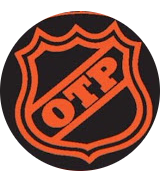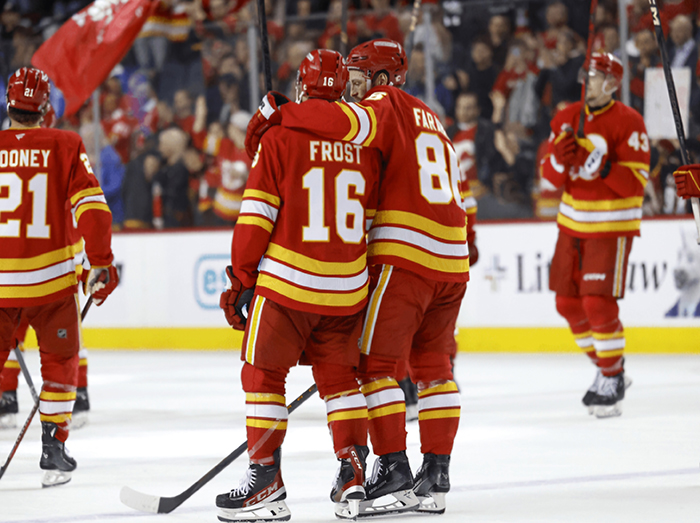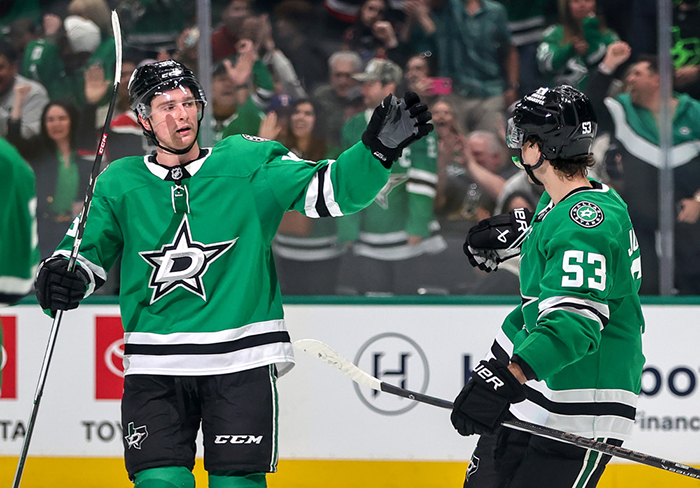The Dallas Stars traded forward Mason Marchment to the Seattle Kraken on Thursday. The return was minimal. The Stars received a 2025 fourth-round Draft pick and a 2024 third-round selection. Earlier in the day, the Stars signed Matt Duchene to a four-year, $18 million contract extension.
Marchment, 30, was a very valuable support piece for the Stars in reaching the Western Conference Final in three straight seasons. He brought size (6-foot-5, 212 pounds), physicality, and a bit of goal scoring support. Marchment is coming off back-to-back seasons with 22 goals. Moreover, he offered some some versatility. Primarily a left winger, the player can also play center in a pinch.
Marchment trade neutralizes the Duchene extension
The reason Dallas general manager Jim Nill accepted such a modest return on the highly regarded role player: salary cap restraints. Marchment has one season remaining on his current $4.5 million average annual value (cap hit) contract signed in the summer of 2022. The Marchment trade cancels out the Duchene extension: The Stars locked in one $4.5 million AAV contract and subtracted a different $4.5 million cap hit.
However, the Stars still have cap problems that Nill must resolve. In particular, the Stars are extremely vulnerable to an offer sheet for restricted free agent forward Mavrik Bourque. The Duchene/Marchment decisions give Dallas just under $5 million of cap space ($4.955 million to be exact). Unfortunately, that’s not nearly enough.
In addition to Bourque, defenseman Nils Lundkvist is an RFA. Stars captain Jamie Benn is an unrestricted free agent. So are Colin Blackwell, Cody Ceci, Evgenii Dadonov, Mikael Granlund, and Brendan Smith.
Could Nill have gotten more for “Mush”?
The short answer is no. The Stars couldn’t do better than two mid-round picks. Three reasons:
- Marchment’s contract has a 10-team no-trade clause. Right off the bat, this eliminated nearly one-third of the NHL as potential destinations (at least unless Marchment agreed to waive his no-trade).
- Time is of the essence. Teams are allowed to exceed the salary cap by up to 10 percent during the offseason. However, the Stars still needed to act immediately, given their cap issues. Nill is far from done. Duchene is signed but there’s a lot of other contracts and roster spots to figure out. Painful choices lie ahead. Marchment was just the beginning.
- The Stars can’t retain cap. The Stars aren’t in position to absorb dead cap space on retention in trades. A Marchment trade partner had to take his whole cap hit. The only reason the Stars didn’t have to add a “sweetener” (Draft pick and/or prospect) is that Marchment’s current contract expires next summer and multiple teams had interest.
Given these conditions, the Stars knew they were trading from a position of weakness. Under the circumstances, the Seattle offer was about as well as Dallas could do.
Familiar turf
Marchment has been in this situation before. When the player produced 18 goals in a bottom-six role for the Florida Panthers in 2021-22, Florida general manager Bill Zito wanted to keep him. Salary cap considerations forced the Panthers to simply allow Marchment to walk as a UFA. That’s when “Mush” signed with the Stars. That’s just life under the hard-cap system.
First and foremost, there are only so many cap dollars available (especially with so little liquidity in the system until recently). The post-pandemic cap was especially unforgiving. High-end role players in particular were — and still are — among the first casualties on teams bumping the ceiling.
Finally, position plays a role. On the trade market, GMs often regard non-star wingers as dime-a-dozen commodities. Quality role-playing wingers like Marchment or Philadelphia’s Garnet Hathaway still find new homes as rentals or free agents. But contending teams often have to sacrifice players they’d have gladly kept if they had sufficient cap space. It’s not a bug of the system. It’s a deliberate feature in the push for parity.
Of course, right now, the Panthers have won three straight Eastern Conference championships. They’ve won back-to-back Stanley Cups. The Edmonton Oilers have won back-to-back Western Conference crowns. The Stars have three Conference Final appearances and a Cup Final run in the 2020s. Consequently, parity currently exists in the “mushy middle”. There’s not really that big of a gap between bubble teams and teams that fall out before the deadline. Those teams are where the Marchment types end up. That is, until rental time on soon-to-expire deals.st
The system is not going to the change. The next Collective Bargaining Agreement won’t bring about an MLB-like “luxury tax” soft cap system. Gary Bettman likes things just as they are now.




